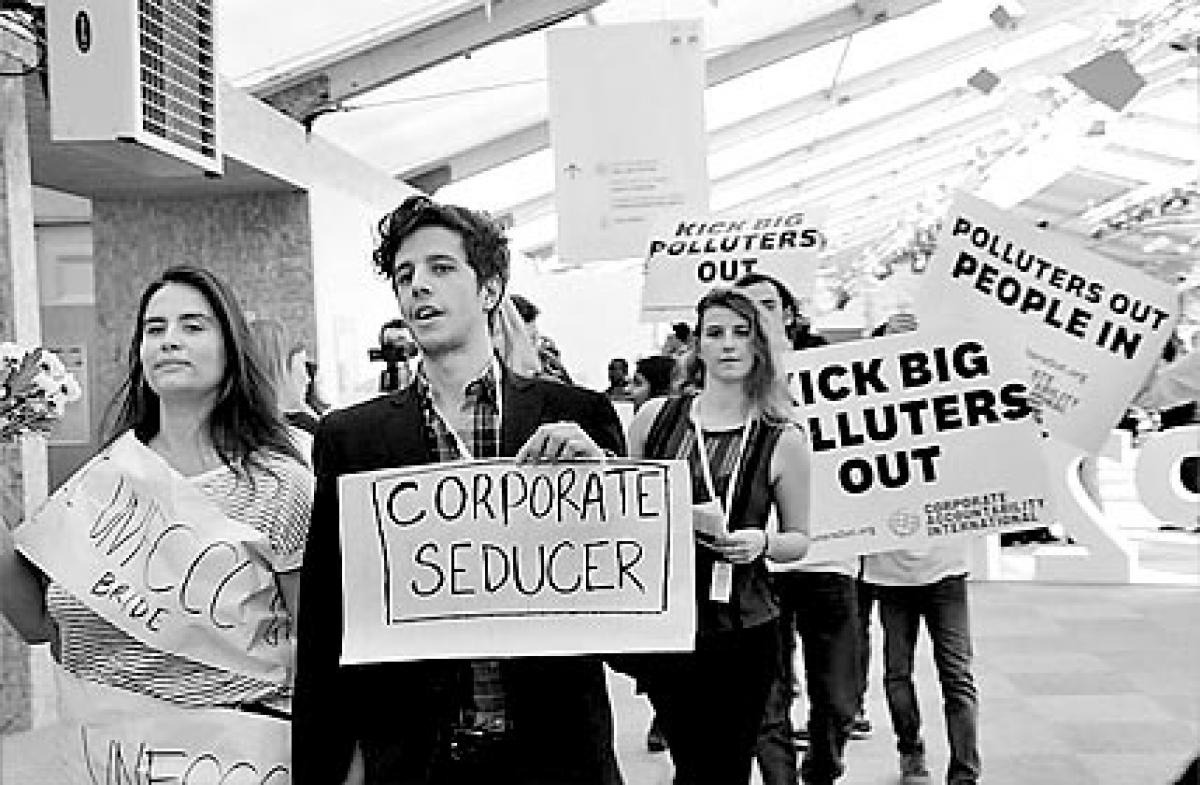Live
- GMR Airports Unveils AI-Powered Digital Twin Platform to Transform Airport Operations
- India poised to become leading maritime player: PM Modi
- Top Causes of Kidney Stones and How to Recognize Silent Symptoms
- India’s renewable energy capacity logs 14.2 pc growth at 213.7 GW
- Winter Session of Odisha Assembly adjourned sine die
- Biden calls Trump's tariff approach 'major mistake'
- After Drama Over Eknath Shinde’s Chief Minister Race, Maharashtra Cabinet Formation Faces New Tensions
- Egyptian FM, Blinken discuss recent developments in Syria
- Iran's supreme leader says Syria's developments result of US-Israeli 'plot'
- Elon Musk to Purchase $100 Million Luxury Mansion Next to Donald Trump's Mar-a-Lago, Report Reveals
Just In

x
Highlights
While what is needed is a fair and ambitious climate agreement, developed countries especially the US are watering down the ambition especially on mitigation and financial commitments. 1.5 degree C meant negative emissions for developed countries but unfortunately this was not highlighted by any party in the negotiations
 While what is needed is a fair and ambitious climate agreement, developed countries especially the US are watering down the ambition especially on mitigation and financial commitments. 1.5 degree C meant negative emissions for developed countries but unfortunately this was not highlighted by any party in the negotiations
While what is needed is a fair and ambitious climate agreement, developed countries especially the US are watering down the ambition especially on mitigation and financial commitments. 1.5 degree C meant negative emissions for developed countries but unfortunately this was not highlighted by any party in the negotiationsThe Centre for Science and Environment (CSE) has said that the current draft text of CoP 21 is “inequitable, weak and unambitious.”
“The current draft Paris Outcome text is weak on commitments and ambition since there are no collective and individual targets for developed countries currently, as it was in the Kyoto Protocol. Moreover, there is no mention of the global carbon budget in the current text which is the only way to operationalise equity,” CSE Deputy Director General Chandra Bhushan said in a press briefing organised at CoP 21.
Elaborating on the climate change narrative, CSE’s Director General Sunita Narain put forth that the think-tank wants ambition on climate change but at the same time does not want it (climate change) to cause further inequity in the world. “The question of cutting emissions is about limiting carbon space,” she said. Expressing concerns over the inadequacy of the INDCs (Intended Nationally Determined Contributions), Narain pointed out that “the question of ratcheting up mechanism of efforts arises.”
She remarked that unless historical responsibility of the developed countries is taken into account, there is no other way to determine fair share. Explaining how the rich developed countries had misappropriated the carbon space in the past and were doing the same for the future, she gave an example of how the US had misappropriated 21 per cent of the total carbon budget from 1850-2011 and from now till 2030, would take away another 10 per cent of the carbon budget. As per the current emission trends, 80 per cent of the carbon budget would be consumed by 2030 itself.
On the issue of 1.5 degree temperature which is the hot topic in the current climate dialogue, Narain pointed out that 1.5 degree was not a new invention and had been advocated by the scientific community since the past 15-20 years. “But now, it is convenient to use in the climate narrative since the carbon budget is already consumed and not much can be done.”
Additionally, she highlighted that agreeing to 1.5 degree C as a long-term temperature goal would mean the carbon budget would further lower down to 550 GtCO2. Both Narain and Bhushan were of the view that 1.5 degree C meant negative emissions for developed countries but unfortunately this was not highlighted by any party in the negotiations. Bhushan said that “reference to 1.5 degree C should be aligned with fair share of carbon budget otherwise there could be no operationalising of equity.”
While what is needed is a fair and ambitious climate agreement, developed countries especially the US are watering down the ambition especially on mitigation and financial commitments. Narain went onto say that India should not agree to the agreement in its current form and push for global carbon budget in the agreement. (Courtesy: Down To Earth; http://www.downtoearth.org.in/news/1-5-degrees-imply-negative-emissions-for-developed-countries-says-cse-52120).
DTE Staff
More On

Next Story
More Stories
ADVERTISEMENT
© 2024 Hyderabad Media House Limited/The Hans India. All rights reserved. Powered by hocalwire.com







